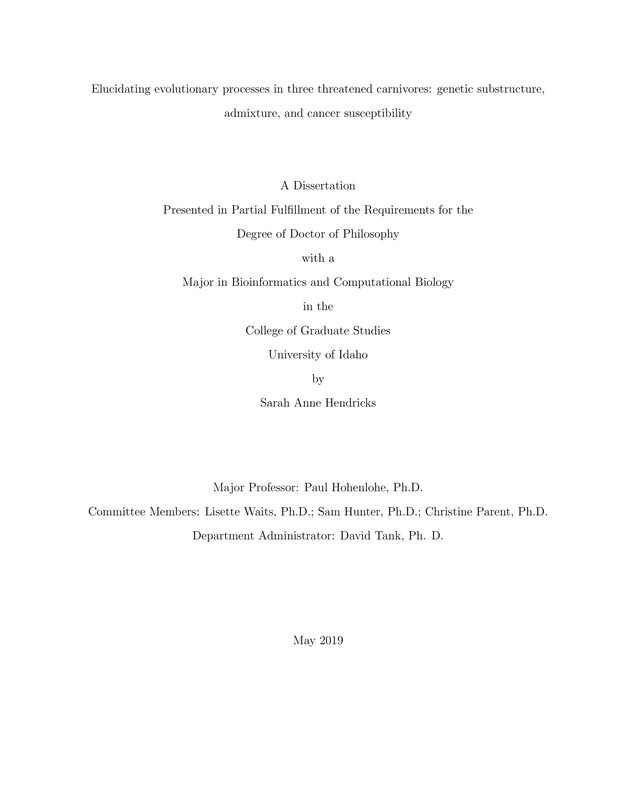Elucidating evolutionary processes in three threatened carnivores: genetic substructure, admixture, and cancer susceptibility
Hendricks, Sarah. (2019-05). Elucidating evolutionary processes in three threatened carnivores: genetic substructure, admixture, and cancer susceptibility. Theses and Dissertations Collection, University of Idaho Library Digital Collections. https://www.lib.uidaho.edu/digital/etd/items/hendricks_idaho_0089e_11553.html
- Title:
- Elucidating evolutionary processes in three threatened carnivores: genetic substructure, admixture, and cancer susceptibility
- Author:
- Hendricks, Sarah
- ORCID:
- 0000-0001-9571-9461
- Date:
- 2019-05
- Embargo Remove Date:
- 2021-09-03
- Program:
- Bioinformatics & Computational Biology
- Subject Category:
- Conservation biology; Evolution & development; Genetics
- Abstract:
-
Advanced genomic techniques can be used to understand threats to global biodiversity and to promote ecosystem conservation. Population structure, migration, admixture, and the genetic basis of adaptive variation can be inferred in small, isolated, and declining populations of interest, thereby adding knowledge necessary for appropriate conservation planning. Here, I present three case examples to illustrate genomics’ potential to influence the management of wild populations. First, Tasmanian devils (Sarcophilus harrisii) face a combination of threats to persistence, including devil facial tumor disease (DFTD), an epidemic transmissible cancer. I used RAD sequencing to investigate genome-wide patterns of genetic diversity and geographic population structure. Our results refine the geographic extent of the zone of mixed ancestry and substructure within it. DFTD has spread across all genetic clusters, but recent evidence points to a genomic response to selection imposed by DFTD. Any allelic variation for resistance to DFTD may be able to spread across the devil population, and/or be present as standing variation in both genetic regions. This can inform the management of genetic variation that existed in pre-diseased populations of the species. Second, wolves (Canis lupus) have naturally reestablished in the Pacific northwest region of North America. I used targeted capture sequencing to acquire SNP data from which I inferred population structure and ancestry. The wolves in Washington state represent an admixed population between the inland Northern Rocky Mountain wolf and the coastal rainforest wolf. Given this admixture, conservation status and management could be impacted if other coastal wolf populations continue to decline in size. Third, Catalina Island (SCA) foxes (Urocyon littoralis catalinae) have a high prevalence of ear canal (ceruminous gland) tumors that appear to be associated with inflammation from chronic ear mite (Otodectes) infections. I tested the hypothesis that the remarkably high incidence of tumors in SCA foxes is the result of genetic variants for cancer susceptibility, which have increased in frequency due to isolation and small population size. Using whole-genome sequencing to identify and genotype polymorphic loci, I found that this trait is likely due to many loci across the genome with small effect. These genetic markers may be used for both monitoring and management in this threatened subspecies. Lastly, the study of the genomics of wildlife cancer is undocumented in a concise way. Therefore, I reviewed and synthesized published literature to record recent studies regarding the genomics of cancer, particularly in endangered taxa. Overall, this review, as well as the results of these three case studies, documents ways in which the genomic consequences of a small population size should be considered when managing species of conservation concern.
- Description:
- doctoral, Ph.D., Bioinformatics & Computational Biology -- University of Idaho - College of Graduate Studies, 2019-05
- Major Professor:
- Hohenlohe, Paul
- Committee:
- Waits, Lisette; Hunter, Samuel; Parent, Christine
- Defense Date:
- 2019-05
- Identifier:
- Hendricks_idaho_0089E_11553
- Type:
- Text
- Format Original:
- Format:
- application/pdf
- Rights:
- In Copyright - Educational Use Permitted. For more information, please contact University of Idaho Library Special Collections and Archives Department at libspec@uidaho.edu.
- Standardized Rights:
- http://rightsstatements.org/vocab/InC-EDU/1.0/

